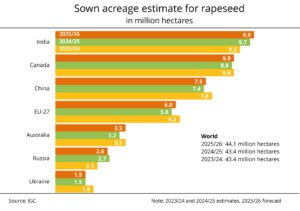IGC projects marginal increase in global rapeseed area for the 2025 harvest

Acreages of rapeseed in the EU-27, Australia, Canada, India, and the US are likely to record increases while the area in Russia is expected to decline.
In its latest estimate, the International Grains Council (IGC) has forecast the global rapeseed area for the 2025/26 marketing season at 44.1 million hectares.
This translates to a 1.4% rise compared to the current season and would be the largest rapeseed area on record.
The EU's output available for the 2024/25 season was significantly limited due to reductions in area and disappointing yields.
EU farmers are now anticipated to have expanded their production areas nearly 4% to 6 million hectares.
According to the IGC, the expansions are mainly driven by attractive prices. Recent reports from Germany suggest that rapeseed stocks are generally in good condition despite strong autumn rains in some regions and dry spells in Eastern Germany at the time of sowing. Only a small fraction of the land required re-sowing.
The outlook for rapeseed production in the major exporting nations is currently still uncertain.
In India, conditions for sowing and germination in the country's most important rapeseed producing region Rajasthan are defined by drought.
What is more, the rapeseed area has declined an estimated 7.2%, falling to 3.12 million hectares.
In Canada and Australia, sowings will not start for several months. Current expectations suggest expanded production areas in both countries – provided demand remains steady.
In the US, an 8.3% increase in rapeseed area is also considered possible. According to research by Agrarmarkt Informations-Gesellschaft, the rise would be based on growing demand from the fuel sector as a consequence of the US Environmental Protection Agency's (EPA) decision to promote biofuels for road and air traffic.
In mid-2024, the EPA approved the use of rapeseed oil as a feedstock for biofuels production, which approval has led to a strong rise in rapeseed imports.












